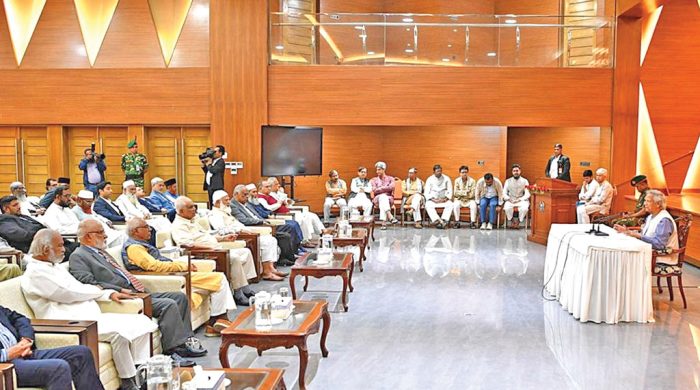Govt urged to respond to Indian campaign strongly

- Update Time : Thursday, December 5, 2024
- 19 Time View

Major political parties on Wednesday suggested that the interim government should strongly address the Indian campaigns against Bangladesh.
Their suggestion came at a dialogue with chief adviser to the interim government Muhammad Yunus held at the Foreign Service Academy in Dhaka city.
Addressing the meeting, amid ongoing anti-Bangladesh propaganda in the Indian media, Yunus said that the entire world needed to know that Bangladesh remained united and what it achieved recently came through united efforts.
The chief adviser sought suggestions from political parties enabling Bangladesh to proceed towards the right path without committing mistakes.
In his opening remarks, Yunus said that an imaginary story was being spread about Bangladesh which was not limited to a single country, but was also circulated to other countries.
Bangladesh by standing united must prove that story false and replace it with what is true, the chief adviser said.
Commenting that many people did not apparently like the ‘new Bangladesh’, Yunus said that the government remained open for foreigners to come and see the situation on the ground.
The chief adviser iterated the nation’s unity, noting that the campaigners against Bangladesh were powerful in resources and arrangements.
After the meeting, law adviser Asif Nazrul while briefing reporters said that the key message of the meeting was that they would remain united to save the interest, sovereignty and existence of the country.
‘We will never deviate from this and there is no reason to think Bangladesh as powerless, weak and submissive. Bangladesh will remain united against any propaganda,’ the law adviser said.
‘We will uphold our unity,’ he said, adding that the entire nation remained united against India’s propaganda.
Informing the media about the issues agreed upon in the meeting, he said that all participants in the dialogue in strongest terms condemned the attack on the Bangladesh assistant High Commission, anti-Bangladesh propaganda and India’s interference in Bangladesh’s internal affairs.
The meeting praised the government’s self-respecting and courageous role against all these Indian steps, he said, adding that all the participants expressed firm solidarity with the government.
At the same time, political parties urged the government to address the Indian propaganda in stronger terms and more quickly, he said, adding that they also suggested that the government should invite foreign friends, other friendly nations and international media outlets to visit Bangladesh.
At the meeting, politicians also demanded that the government should make public all the agreements between Bangladesh and India done in the past 15 years.
They also demanded the cancellation of all the harmful agreements, including the Rampal Power Plant, he added.
‘India’s economic oppression of Bangladesh, attempts to establish dominance, and interference in Bangladesh’s internal affairs have been condemned. The meeting made a call upon the outsiders to behave with dignity and good neighbourliness,’ he said.
He said that finally, everyone present at the meeting stressed that no room would be allowed to think that Bangladesh was powerless, weak or kneeling.
‘We will remain united against any kind of propaganda and provocation. If any propaganda or provocation comes in the future, we will continue to make efforts to forge our unity even stronger,’ Asif Nazrul said.
‘The meeting also suggested a joint rally, a joint political council, a joint security council in this situation,’ he said.
Having mentioned that despite fundamental difference in political views, paths, and ideals, the representatives of the political parties attending the dialogue vowed to stand united on the issue of national interest, sovereignty and existence, the adviser said.
Later, BNP standing committee member Khandaker Mosharraf Hossain told reporters that the chief adviser had discussed with the political parties, seeking their cooperation to protect the national sovereignty.
The independence that Bangladesh was won through the martyrdom of thousands of people, he said, adding that in this month of victory, they all vowed their conviction to stand beside the interim government in this situation, Khandaker Mosharraf added.
‘Their [the interim government] responsibility is to protect the independence, sovereignty and establish democracy in this country. Everyone must forge consensus against the fascist, fallen government that is conspiring against our country from abroad,’ he said.
Stating that this conspiracy was an attempt to create division among the people of Bangladesh, the BNP leader said, ‘We have reached an agreement with the government that just as we, the people, dismissed the fascist government through a mass uprising in July-August, we, the students and people of this country, will jointly confront their conspiracy and those who are supporting them.’
Regarding the elections, he said that this government was committed to restoring the rights of the people.
‘Therefore, we suggested that the government should implement reforms very quickly and give a roadmap for the elections,’ he said.
Commenting that no one would dare to conspire again once the election roadmap was published, he vowed, ‘We, the students and people will confront their conspiracy.’
Representatives from various political parties and alliances, including BNP, Bangladesh Jaamat-e-Islami, Ganatantra Mancha, 12-party alliance, Left Democratic Alliance, Bangladesh Jatiya Party, and Hefazat-e-Islam Bangladesh, were present in the dialogue.
Liberal Democratic Party chairman Oli Ahmed, however, went to the Foreign Service Academy but could not join the dialogue as his name was not in the guest list.
Earlier on Tuesday, Yunus held a meeting with the representatives of the Student Movement Against Discrimination at his official residence state guest house Jamuna.
He is scheduled to hold a meeting with representatives of different religious groups on Thursday.
On Tuesday, Bangladesh mission at Agartala in India was closed on security grounds, a day after it came under attack by a group of Indian protesters during a violent demonstration.
While addressing the West Bengal Assembly on Monday, Mamata called for the deployment of UN peacekeepers and Indian prime minister Narendra Modi’s personal intervention to secure the safety of religious minorities in Bangladesh.















